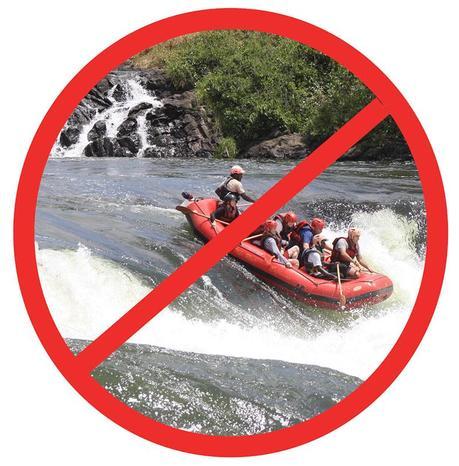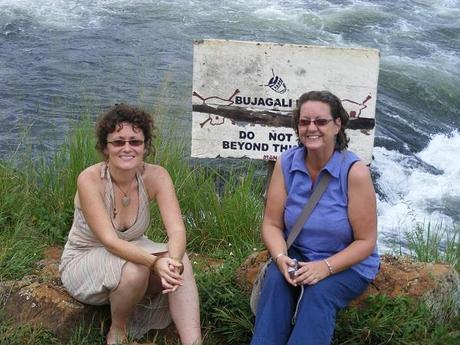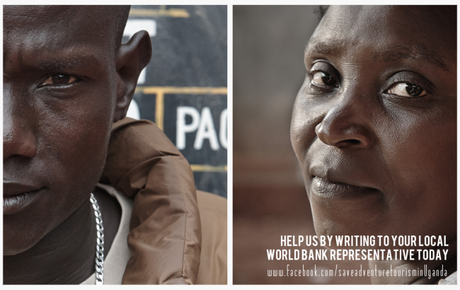Save the Nile. Help us Save Adventure Tourism in Uganda

Access denied. If the Isimba Dam is constructed at its current proposed height, the rapids will be flooded and Uganda’s world class Grade 5 white water rafting will be consigned to history forever. Please help us get this decision changed! Photo Nile River Explorers.
The situation regarding the Isimba Hydro Power Project on the River Nile below Jinja has reached a critical stage!
In the next few weeks The World Bank, and Uganda’s National Environmental Management Authority (NEMA) will decide on the final size and scale of the Hydro Power Project. Will they authorize a smaller version of the dam? Or will they break an international agreement between the World Bank and the Government of Uganda to conserve this beautiful stretch of white water, and protect the booming adventure tourism industry and thousands of local jobs?
This decision is going on largely behind closed doors but we need to let the World Bank know that protecting the river and the Ugandan tourism industry is IMPORTANT TO YOU!
Background to the project
The Ministry of Energy and Mineral Development is planning to construct a hydro dam on the Nile at Isimba Falls, 50 km downstream from Jinja. The new dam will create a large reservoir of around 28 km² submerging the white water rapids on this section of the River Nile.
When the Bujagali Dam (hydroelectric power plant) was constructed, the World Bank and the Government of Uganda signed the Kalagala Offset Agreement. This binding agreement is supposed to protect specific, downstream sections of the River Nile free of construction of new dams and also protect the integrity of Mabira Forest.

Back in the day… posing for photos at Bujagali Falls, Jinja, 2010 #SavetheNile
According to Wolfgang Thome, “any change of heart by the World Bank would amount to a fundamental breach of confidence and trust between the Bank and Uganda’s tourism fraternity.”
After the rapids at Bujagali were flooded, the rafting and kayaking companies moved activities downstream – below the dam – at significant expense. What will happen this time?
What impact will a new dam have?
This exceptional stretch of white water is famous worldwide. It is safe and warm; its consistent flows allow access to the river activities throughout the year, bringing tens of thousands of people to Uganda annually. A booming industry has been built around the white water and Jinja is regarded as the ‘adventure capital of East Africa.’ A large number of thriving businesses have grown around the central river adventure tourism activities: hotels, restaurants, taxi companies, boda boda drivers and shops.
An estimated 50,000 people take part in adventure activities every year around Jinja; many of whom would not travel to Uganda were it not for the amazing rapids.
If the Isimba Falls Project goes ahead in its current form, it will be a MASSIVE economic blow to Jinja. An independent study on the impact of the Isimba Hydro Project lists over 200 tourism related companies that will be affected. The vast majority are owned and run by Ugandans; collectively they employ thousands of Ugandans in long term, well-paid jobs.
Although “Isimba dam to create 3,000 jobs” – apparently – these are only temporary: constructing the dam.
Although different options for the size and scale of the Isimba dam were proposed, the decision has already been made to go with the largest scale option, the one that will destroy tourism.
The smaller dam option offers a balance of: much needed extra power for Uganda, while allowing adventure tourism to continue to flourish and expand, driving development forwards in the Jinja region.

You can also help by sharing this post and information – thank you! #conservation #Uganda #Nile #savetheNile#saveadventuretourisminUganda
Save the Nile. You can help!
Please email and/or write to your local World Bank representative, wherever you are in the world, and let them know that you are concerned about this issue!
You can find your local World Bank representative contact details here. [The Uganda World Bank contact is: Sheila Gashishiri, Communications Associate
+256-414-302-248 / 414-230-094 [email protected] ]
Please send them a letter and write them an email expressing your concerns. A template for the email/letter is below, which we suggest you modify to make it more personal:
Dear (ENTER REPRESENTATIVE’S NAME),
Representative for the World Bank in (ENTER YOUR HOME COUNTRY / REGION).
I am writing as a concerned citizen of (ENTER YOUR COUNTRY) about a serious issue in Uganda, which directly concerns The World Bank.
As a mitigation measure for the (World Bank backed) Bujagali Hydro Power Project, a conservation agreement called the Kalagala Offset Agreement was formed. The agreement between the World Bank and the Government of Uganda was put in place to protect the remaining stretch of rapids and river banks in the same region, for the sake of minimizing impact on the environment, the local people and eco tourism which flourishes in the area. Now, the Isimba Hydro Power Project will flood a significant portion of this conservation area – thus breaking this agreement.
Isimba HPP is funded by the Chinese government, and due to be constructed by a Chinese construction firm, both of whom seem unconcerned that a conservation area is due to be flooded. I am urging The World Bank to act on behalf of the thousands of Ugandans due to be negatively effected, as well as the environment, and the tourism that generates large amounts of income in an otherwise under developed region. Fifteen thousand people, including 12,000 Ugandans from the immediate area, have signed a petition demanding the agreement be upheld and a smaller version of the Isimba HPP to be constructed (which would leave the conservation area unaffected).
Please stand up to China and the Ugandan government and uphold the agreement that is laid out by The World Bank to protect the stretch of river due to be flooded.
Thank you for your support and understanding.
(ENTER NAME)
How else can I help #SavetheNile?
Like and share the ‘Save Adventure Tourism in Uganda’ Facebook page
Forward this message to anyone that can help raise awareness.
Please write to your World Bank representative TODAY about the Isimba Falls hydro power (dam) project – this is the most constructive way you can help.
You can also help by sharing this post and information – thank you!
Information courtesy of The Save Adventure Tourism in Uganda Team [email protected]
“Isimba Dam resurrects old environment-development debate,” wrote Solomon Oleny in the New Vision.
And I haven’t even started on the negative environmental and cultural impacts of this huge infrastructure project …
Tags:
Conservation, Jinja, Nile, saveadventuretourisminUganda, SavetheNile, Source of the Nile, Uganda« A rollex-fuelled tour of Uganda and Africa by bike #HumanSpirit

